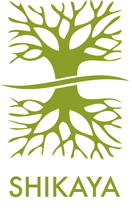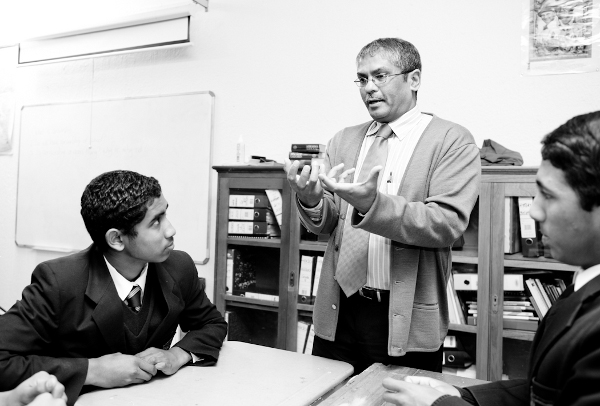Roy Hellenberg Article
In 2013, Facing History and Ourselves will celebrate a significant anniversary: 10 years of collaborative work with educators, students, and schools across South Africa. Since 2003, Facing History has had an active presence in South Africa through the Facing the Past program in partnership with Shikaya and the Western Cape Education Department. Facing the Past has trained over 340 teachers and has reached more than 100,000 students in over 180 schools. Facing the Past also works with students taking part in leadership programs developed by Shikaya and has trained over 590 pre-service educators. Through this work in schools, universities, and communities, Facing History engages students, teachers, education officials, and community members in important and necessary discussions on issues of identity, membership, history, memory, judgment, the legacies of the past, and democratic participation. Facing the Past’s work plays a critical role in South Africa’s transition to democracy. With the partnership’s 10th anniversary approaching, Roy Hellenberg, a teacher at the Rondebosch Boys' High School in Cape Town who has worked closely with Facing the Past for many years, reflected on the importance of nurturing democracy and creating a classroom atmosphere where differences are honored and active discussion takes place every day.
Growing up in South Africa, I was the youngest in my family. Despite that, when it came to arguing, no special consideration was afforded me. There were 13 of us and family conversation often ranged from politics to religion, from education to human rights. Debates were won based on the strength of our arguments and the passion with which we communicated them.
It was in these moments that I first learned one of the most important lessons of discussion: respect for the person you are in conversation with. It was here that I learned to probe, prod, dissect, and dismantle the arguments of others. I realized the importance of respecting the views of others and the value in being open to reevaluating my own preconceived ideas.
Today, as an educator, why do I value debate, differing viewpoints, and the rights of others to think differently than I do? In large part it is because of these early experiences – both with my family and in school. My high school history teacher held a viewpoint on the political situation in South Africa in the early 1980s that was different from the views held by my church leaders. My siblings embraced a host of beliefs and convictions that were different from my parents’. (I suspect this was possible because it was impossible for my parents to keep track of all 13 of us!) These dissenting voices helped me to develop the important skills of critical thinking and forced me to question myself and those around me. Who do I believe? Why should I believe this point over that one? Why should I follow this ideology and not another? It is this richness of opposing ideas that I wish to create in my classroom.

I try to foster this atmosphere in a number of ways. I approach teaching with an understanding that as an educator, I am not a neutral conveyer of facts. I arrive at my classroom on any given day aware of my biases and value systems. Realizing that I have my own predispositions and experiences allows me to “take them off,” like a pair of spectacles. I can examine them and become aware of how they make me “see” the world. This makes me cautious and open to understanding that, even though I may have deeply held beliefs, they are simply choices I have made – they don’t necessarily represent truth itself. My students might hold a different truth from mine. The principal of my school might hold truths that are different from mine. The teacher in the classroom next to mine might hold different truths. This understanding helps me create a classroom that is rich with opportunities for debate and encouraging of challenges.
I believe that young people are far more resilient than we often give them credit for. I show my students that I will allow for my own views to be challenged, dissected, and even sometimes, discounted. This develops an environment of mutual respect where ideas, once voiced, become something we can all interact with, without it being attached to a particular ego or person.
 Creating an environment that allows for democratic thinking and practices to emerge requires more than words. It requires that we, as teachers, live the values embodied in critical thinking. How can I expect students to make themselves vulnerable and expose their ideas to criticism if I am not willing to do the same myself? How can I encourage my students to become active citizens and challenge the people and practices that undermine democracy, and then fail to take any action myself in the face of injustice? Active citizenship that can transform communities and even countries requires first taking action in the immediate environment. Speaking up against “small” injustices often can be more impactful than looking for big causes to fight. Can we really tackle xenophobic violence when we turn a blind eye to bullying in the playground? Can we fight for a more accountable government, if teachers at our own schools are not called to account? Teaching democratic values is not contained in a series of lessons; it is a lifestyle, an ethos that one creates.
Creating an environment that allows for democratic thinking and practices to emerge requires more than words. It requires that we, as teachers, live the values embodied in critical thinking. How can I expect students to make themselves vulnerable and expose their ideas to criticism if I am not willing to do the same myself? How can I encourage my students to become active citizens and challenge the people and practices that undermine democracy, and then fail to take any action myself in the face of injustice? Active citizenship that can transform communities and even countries requires first taking action in the immediate environment. Speaking up against “small” injustices often can be more impactful than looking for big causes to fight. Can we really tackle xenophobic violence when we turn a blind eye to bullying in the playground? Can we fight for a more accountable government, if teachers at our own schools are not called to account? Teaching democratic values is not contained in a series of lessons; it is a lifestyle, an ethos that one creates.
To encourage active citizens that respect and value the democratic principles of our country’s constitution, it is important not only to pay attention to what happens in the classroom. We must also respect our students’ humanness in their lives beyond school and the four walls of the classroom. We must trust them to provide leadership. We must give them the time, space, and opportunity to grapple with these democratic values until they take root. We must spur them to action. And we must listen.
**********************
Learn more about our work in South Africa.
This article was written by Facing History’s Julia Rappaport. F


